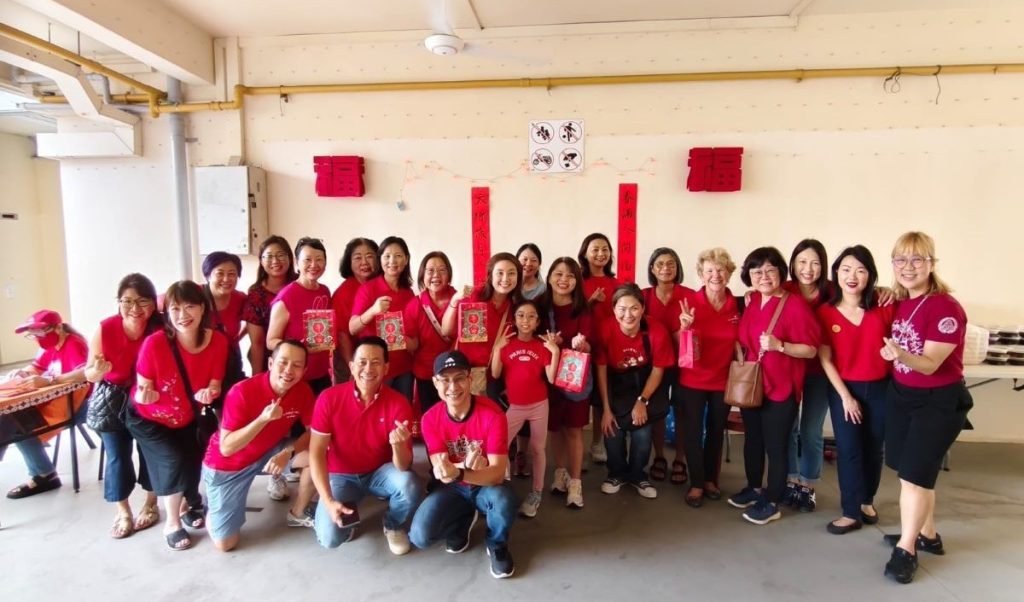As Wesley celebrates the 40th Anniversary of Small Group Ministry (SGM) in August 2025, Rev Gladwin Lee, who oversees SGM, reflects on the heart of this ministry and the friendships that shape our church community.
Reflections from a July Sermon on Romans 12:9–10
This past July, I had the privilege of preaching on Romans 12:9–10—a passage that has been deeply formative in my own journey and continues to shape the vision of our church. As I stood before our congregation to preach the sermon In the company of friends at The Saturday Service and Prayer & Praise on 26 & 27 July, I sensed again the urgent call to community, to love that is not merely surface-deep but springs from the heart of God Himself. I’d like to share with you, the wider church family, a distillation of that message and offer some reflections on why Small Group Ministry stands at the very heart of our life together.
Let Love Be Genuine: The Foundation
“Let love be genuine; hate what is evil, hold fast to what is good; love one another with mutual affection; outdo one another in showing honour.” (Rom 12:9–10, NRSVA)
Paul’s instruction to the early church is as radical now as it was two thousand years ago. He calls us not merely to be friendly, but to embody a love that is sincere—unmasked and unwavering, echoing the very love of Christ. The authenticity of such love, writes commentator Joseph Fitzmyer, is not a performance but a “reflex of the love that Christ himself showed to humanity.” This is not the “fake love” lamented in modern pop songs, but love without hypocrisy, flowing from the heart.
Small Groups provide the soil in which this genuine love can take root and flourish. But what does this look like in practice?
Three Types of Friendships: Utility, Pleasure, Virtue
Centuries before Paul, Aristotle described three types of friendships: of utility, of pleasure and of virtue. These categories, when seen through the lens of the gospel, invite us to reflect on how we relate to each other in Christian community.
- Friendships of Utility are based on mutual benefit. Think of colleagues who support each other at work or classmates who share notes during exam season. These bonds are practical but frequently fade when the common need disappears.
- Friendships of Pleasure revolve around shared enjoyment—teammates, hobby groups or those who gather for laughter and leisure. While treasured, these ties often wane as interests change or life seasons shift.
- Friendships of Virtue, however, are the highest form. These are rooted in shared values and a commitment to help each other grow, not for what we can get but for the good we see in one another. This is the kind of friendship the church is called to nurture — a bond sustained through hardship and change, grounded in Christ and oriented toward spiritual flourishing.

In my own life, I’ve experienced all three kinds. I’ve benefitted from the support of study partners and the camaraderie of sports teammates. But the friendships that have endured — the ones that have truly transformed me—have been those of virtue: friends who walk with me in faith, who encourage, challenge and love me in Christ.
Virtue and the Practice of Love
Christian virtue doesn’t emerge overnight; it is formed through repeated practice in community. As Tim Suttle notes in his book Shrink, virtues are not simply traits we possess but habits we choose, day after day. We don’t become patient simply by reading and meditating that love is patient; we develop patience by exercising it, often in inconvenient or challenging moments.
Small Groups are where these habits are forged. They are workshops for spiritual formation, spaces where we move beyond theory and into the daily practice of loving one another as Christ loves us. The goal is not perfect behaviour but faithfulness—a willingness to show up, to listen, to serve, to forgive and to grow together.

The Pillars of Transformative Community
As I shared in my July sermon, for friendships of virtue to thrive in our church, three pillars are required: Stability, Solidarity and Grace.
1. Stability: Rootedness in Community
In an age of endless options and distractions, stability can feel countercultural. We are tempted to seek community on our own terms—entering and exiting when it suits us, keeping commitments light and expectations low. But genuine spiritual growth requires staying power: choosing to be present, to plant roots and to invest long-term in the lives of others.
Drawing on the Benedictine tradition, stability calls us to grow where we are planted, to weather the seasons together and to bear fruit in time. Like the patient orchard keeper, we may not see immediate results, but through perseverance, bonds of trust and love deepen and the harvest of genuine friendship becomes sweet.
2. Solidarity: Walking with One Another in the Mess
Solidarity means entering into each other’s struggles, not with judgement or superiority, but with empathy and gentleness. It is the willingness to break down walls that divide us—whether those walls are built from prejudice, fear or simple misunderstanding.
In the family of God, there will be those whose “mess” is visible and those whose struggles are hidden beneath the surface. Mental illness, broken relationships, past mistakes—these are realities that many carry quietly. To practise solidarity is to create space for vulnerability, to listen deeply and to offer the healing presence of Christ to one another.
We must resist the temptation to reduce outreach to a project or to limit our welcome to those who are most like us. The true test of our community is whether we are ready to receive anyone God brings to us, embracing the diversity of stories, backgrounds and needs.

3. Grace: Forgiveness and Reconciliation
Even in the best communities, conflict and disappointment are inevitable. Grace is what allows us to continue walking together when misunderstandings arise, when patience is tested and when forgiveness is hard.
Grace is more than a theological concept; it is a daily practice. As Chris Rice writes in Grace Matters, we grow into God’s love by extending grace, especially when it seems undeserved or unreasonable. True grace means loving those who frustrate us, remaining committed when we’d rather walk away and trusting that God is using these very moments to shape us into the likeness of Christ.
In my own family and friendships, I am continually learning the art of grace—failing, trying again and remembering that God’s transforming work is ongoing, in me and in those around me.
The Call: Small Groups as Workshops of Christlike Love
Why do we place such importance on Small Groups? Because it is here, in the context of committed, honest relationships, that we learn to love—not just in word but in deed. We discover what it means to bear each other’s burdens, to celebrate joys and to persevere through hardship. We are reminded that no one should walk alone.
If you are not yet part of a Small Group, I urge you to consider joining—not to satisfy a church programme or to fulfil a key performance indicator, but so that you may find and become a true friend of virtue. In Small Groups, we find companions for the journey, mentors for our faith and a refuge for our struggles.
May Paul’s exhortation in Romans 12:9–10 find its fulfilment among us: “Let love be genuine; hate what is evil, hold fast to what is good; love one another with mutual affection; outdo one another in showing honour” (NRSVA). May our Small Groups become gardens where virtue grows, where no one is left behind and where the love of Christ is made tangible in every word and deed.
Let us pray that we, as a church, will be known for the depth of our friendships, the resilience of our love and the beauty of our community—so that Christ’s light will shine ever more brightly through us.

Find out more about Small Group Ministry here
Check out Small Group locations here
Read also: Finding Joy through Serving at COSC’s Inaugural Block Party; Finding Faith, Friendship and Purpose in Small Group Community: Diakonia Small Group







